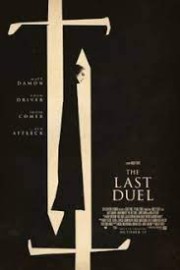The Last Duel
**CW/TW “The Last Duel” has scenes of sexual assault and rape. Though not graphic, they could be triggering.
With his last feature, Ridley Scott had to reshoot an actor’s performance with another actor because of allegations of sexual assault. In “The Last Duel,” the director is dealing with a story about sexual assault, believing women and men who look at rape only from their particular vantage points. The result is fascinating and filled with strong work from the main actors, although the film’s 2 1/2 running time can test our patience with its unique structure. Regardless, Sir Ridley is firing on all cylinders as a storyteller.
“The Last Duel” is based on a historical book by Eric Jager about the famous case of Jean de Carrouges (Matt Damon), a squire-turned-knight in 14th Century France, whose wife, Marguerite de Thibouville (Jodie Comer), accused his former friend, Jacques Le Gris (Adam Driver), of raping Marguerite. The subsequent trial resulted in the last-ever trial by combat in France, and is debated to this day. Though the events are not completely relatable to the modern day, the skepticism surrounding Marguerite’s charges are very familiar to any person who’s come forward against powerful men before, as are the men’s reactions to being told (for Jean) and being accused (for Jacques). What really happened? All we know is what is public. “The Last Duel” is the attempt on Scott’s end to be honest to the truth of all of the main characters.
The screenplay by Nicole Holofcener, Ben Affleck and Matt Damon takes the “Rashomon” approach to telling this story. The first thing we see is the preparation for the duel of the three main characters. As the duel starts, we move back in time to how everyone got here. Our first perspective is Jean de Carrouges’s. He is a soldier loyal to the crown whose esteem seems borrowed more from the legacy of his father and grandfather than anything he does. When he sees Marguerite, he is immediately smitten, and soon marrying her. But it seems as though Le Gris, whose life Jean saved on the battlefield, has come more into favor with the local Count Pierre (Ben Affleck, in a performance that reminds us of how wickedly funny he is). As Pierre’s decisions seem to favor Le Gris and harm the life de Carrouge has in mind for himself, he must try and carry himself in favor of the court for appearances. When Marguerite is raped (which we do not yet see), Jean’s first thoughts are towards himself more than his wife. He comes to believe her, though, and is even willing to put his life on the line for her.
At this point, we move to Le Gris’s point-of-view, and one of the things I really like about the film’s structure is how we not only see new pieces of the narrative puzzle, but the way different scenes play from different vantage points. Most curious are those scenes between these characters that we don’t see more than once- does that mean the truth of the scene from one character’s POV is indeed accurate? There’s a scene in Le Gris’s section that certainly makes us wonder about whether both characters saw it the same way. Then again, there’s another one in Marguerite’s that deflates any notions of feelings being reciprocated between the two.
Marguerite’s is next, and it is the heart of the film. Comer is fantastic in the role, and seeing her with both Jean and Le Gris in this section especially gives us the most full perspective of her that we’ve seen. Jean and Le Gris see her as an object to be won in life- for Jean, a chance at a male heir, and for Le Gris, more than just a one night stand. Neither of them take her feelings into consideration, and even in the duel, we cannot help but think they are simply still thinking of themselves.
In addition to Comer, Damon and Driver do very good work in their roles. Scott does a customarily great job of bringing 14th Century France to life in the same way he did in “Gladiator” and “Kingdom of Heaven,” but the film comes down to the story. Because of the sometimes-repetitive nature of the story structure, the film’s running time feels a bit long, but once it comes down to Marguerite’s experience, the movie lands what it wants to say about how women are treated in a society where men rule, and often only see women as sexual objects, whether it’s for pleasure or breeding. We see how power is utilized by men, as well as medieval ideas of pregnancy and sexual activity have continued to this day. Probably the most powerful moment in the film is from Marguerite, when her and Jean are talking about her honesty, and how, if she had to do it over again, maybe she would have done what so many before her, and after her, have done, and just let the past alone. After all, we’ve seen too many times what happens to women who speak up. She had as much to lose as anyone. She stands as an inspiration to many after her.










